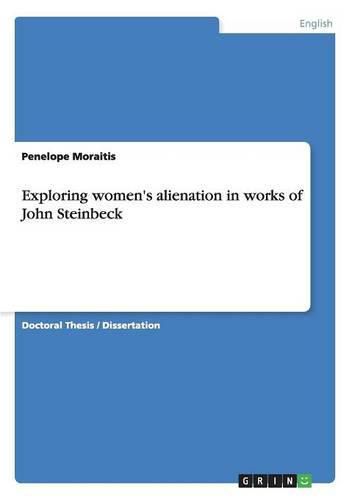Readings Newsletter
Become a Readings Member to make your shopping experience even easier.
Sign in or sign up for free!
You’re not far away from qualifying for FREE standard shipping within Australia
You’ve qualified for FREE standard shipping within Australia
The cart is loading…






This title is printed to order. This book may have been self-published. If so, we cannot guarantee the quality of the content. In the main most books will have gone through the editing process however some may not. We therefore suggest that you be aware of this before ordering this book. If in doubt check either the author or publisher’s details as we are unable to accept any returns unless they are faulty. Please contact us if you have any questions.
Doctoral Thesis / Dissertation from the year 2000 in the subject American Studies - Literature, grade: 7/10, National & Kapodistrian University of Athens (Department of English Studies), language: English, abstract: This study focuses on the theme of the alienated woman in John Steinbeck’s canon. The novelist, consistent in his depiction of his female characters as stereotypes from the beginning of his career as a writer until the end, reveals the alienation they experience in the predetermined roles they assume in life - mothers, wives, sexual objects. The term alienation is applied to describe a certain condition Steinbeck’s women figures experience, as this is defined in the context of Socialist Feminist thought, particularly Alison Jaggar’s reinterpretation of the Marxist concept of alienation. Despite their ostensible differences, female characters in Steinbeck’s writing share a common characteristic; they are alienated from the product upon which they work . As prostitutes, when their role and motif is erotic, Steinbeck’s female figures are - in the same way a factory worker is alienated from his product - alienated from themselves and their body which becomes an object for men. In turn, wives are not seen as entities who feel, suffer, think to act independently, but confined within the boundaries of their domesticity are objectified to the extreme and are relentlessly exploited. Depicting his female characters in the role of mother are stereotypes of a socially accepted model, the author not only attempts to render the reality of his time, and to understand motherhood as one of the facets of woman’s polymorphic existence, but also to reveal the alienation woman experience, obliged to act in such a stereotyped mother role. The perpetuation of mothering in its existing form is also sharply depicted by Steinbeck in the mother/daughter pattern. Despite his being labeled as a masculine writer John Steinbeck dares to present through his works, moreover, tabo
$9.00 standard shipping within Australia
FREE standard shipping within Australia for orders over $100.00
Express & International shipping calculated at checkout
This title is printed to order. This book may have been self-published. If so, we cannot guarantee the quality of the content. In the main most books will have gone through the editing process however some may not. We therefore suggest that you be aware of this before ordering this book. If in doubt check either the author or publisher’s details as we are unable to accept any returns unless they are faulty. Please contact us if you have any questions.
Doctoral Thesis / Dissertation from the year 2000 in the subject American Studies - Literature, grade: 7/10, National & Kapodistrian University of Athens (Department of English Studies), language: English, abstract: This study focuses on the theme of the alienated woman in John Steinbeck’s canon. The novelist, consistent in his depiction of his female characters as stereotypes from the beginning of his career as a writer until the end, reveals the alienation they experience in the predetermined roles they assume in life - mothers, wives, sexual objects. The term alienation is applied to describe a certain condition Steinbeck’s women figures experience, as this is defined in the context of Socialist Feminist thought, particularly Alison Jaggar’s reinterpretation of the Marxist concept of alienation. Despite their ostensible differences, female characters in Steinbeck’s writing share a common characteristic; they are alienated from the product upon which they work . As prostitutes, when their role and motif is erotic, Steinbeck’s female figures are - in the same way a factory worker is alienated from his product - alienated from themselves and their body which becomes an object for men. In turn, wives are not seen as entities who feel, suffer, think to act independently, but confined within the boundaries of their domesticity are objectified to the extreme and are relentlessly exploited. Depicting his female characters in the role of mother are stereotypes of a socially accepted model, the author not only attempts to render the reality of his time, and to understand motherhood as one of the facets of woman’s polymorphic existence, but also to reveal the alienation woman experience, obliged to act in such a stereotyped mother role. The perpetuation of mothering in its existing form is also sharply depicted by Steinbeck in the mother/daughter pattern. Despite his being labeled as a masculine writer John Steinbeck dares to present through his works, moreover, tabo